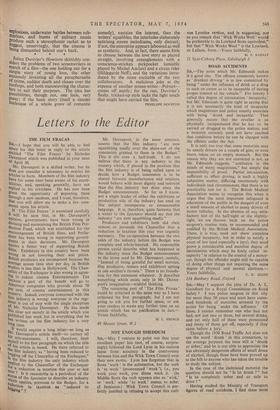ROAD ACCIDENTS
Sta,—The point which Mr. Edmunds makes is a good one. The offence commonly known as drunken driving' is in law committed by being " under the influence of drink or a drug to such an extent as to be incapable of having proper control of the vehicle." For brevity 1 called this degree of intoxication incapacity,' but Mr: Edmunds is quite right in saying that it is not necessarily the kind of incapacity which magistrates and police usually associate with being ' drunk and incapable.' That generally means that the reveller is so physically incapacitated that he has to be carried or dragged to the police station, and a motorist certainly need not have reached that condition before he can be charged with the offence under the Act.
It is only too true that some motorists may be unsafe drivers on a couple of gins, or even beers, taken on an empty stomach. But the reason why they are not convicted is not, as Mr. Edmunds suggests, "confusion in the minds of many magistrates," but simply the impossibility of proof. Partial intoxication, sufficient to affect driving, is such a highly subjective matter, differing enormously with individuals and circumstances, that there is no practicable test for it. The British Medical Association seems to recognise this when it urges that the most important safeguard is education of the public in the dangers of even -a small amount of alcohol to many drivers of motor vehicles. In the absence of any satis- factory test of the half-tight or the slightly- tight, we are thrown back on the police surgeon's routine tests, as recommended and codified by the British Medical Association. These, it is true, need not show complete physical incapacity, but in order to satisfy a court of law (and especially a jury), they musf prove a considerable and manifest degree of intoxication which may be fairly called in- capacity' in relation to the control of a motor- car, though the offender might still be capable of doing other things not requiring the same degree of physical and mental alertness.— Yours faithfully, C. K. ALLEN 114 Banbury Road, Oxford










































 Previous page
Previous page